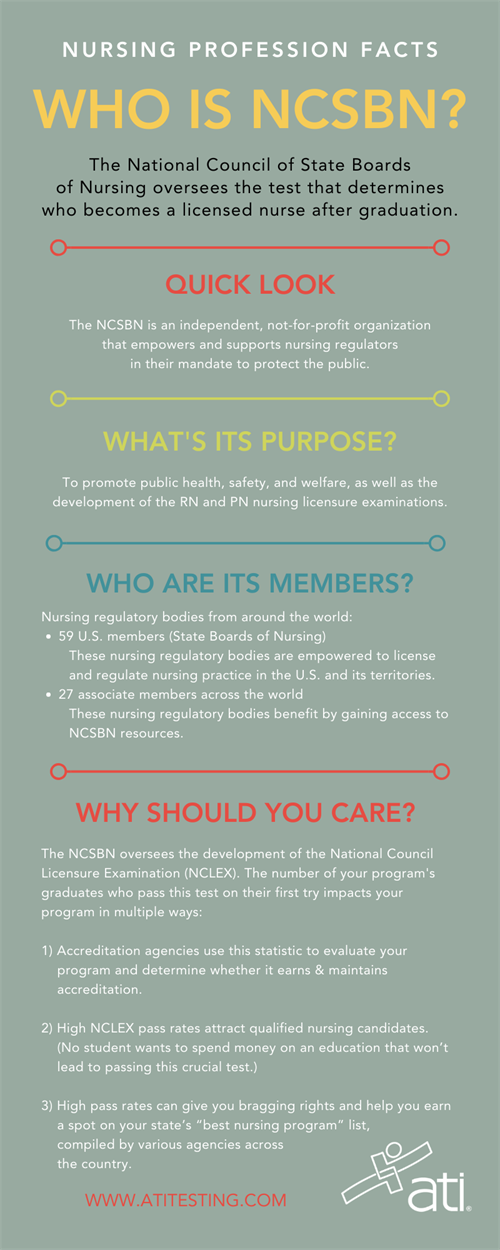THE NCSBN: WHAT YOU NEED TO KNOW
WHY THE NCSBN IS THE MOST IMPORTANT ORGANIZATION IN NURSING
DOWNLOAD THE INFOGRAPHIC BELOW AS A HANDY REFERENCE
 1. WHO IS THE NCSBN?
1. WHO IS THE NCSBN?
The National Council of State Boards of Nursing (NCSBN) oversees the most important test in nursing: the National Council Licensure Examination (NCLEX). This test determines who becomes a licensed nurse after graduation (and, perhaps more importantly, who doesn’t). As an independent, not-for-profit organization for more than 40 years, the NCSBN empowers and supports nursing regulators in a crucial mandate: to protect the public.
2. WHAT'S THE PURPOSE OF THE NCSBN?
The NCSBN’s mission is to protect the safety and welfare of patients. One of the key ways it fulfills this goal is through development of 2 nursing license exams, 1 for registered nurses (RNs) and 1 for practical nurses (PNs). These standardized tests ensure all nursing graduates are tested on the same, entry-level competencies needed to provide safe nursing care.
The NCSBN also empowers and supports nursing regulatory bodies that oversee licensing efforts and nursing practice across the U.S. The organization pursues evidence-based research to develop products and services that aid these groups and strengthen nursing and regulatory knowledge.
3. WHO ARE THE NCSBN’S MEMBERS?
Nursing regulatory bodies from around the world:
- 59 U.S. members (State Boards of Nursing)
These nursing regulatory bodies are empowered to license and regulate nursing practice in the U.S. and its territories. They include:
- the District of Columbia
- 3 U.S. territories (American Samoa, Guam, Northern Mariana Islands, and the Virgin Islands)
- 3 states (California, Louisiana, and West Virginia) with 2 nursing regulatory bodies, 1 for RNs and 1 for licensed practical/vocational nurses (LPN/VNs)
- 1 state (Nebraska) with 2 nursing regulatory bodies, 1 for RNs and licensed practical/vocational nurses (LPN/VNs), and 1 for advanced practice nurses (APRNs).
- 27 associate members across the world
These nursing regulatory bodies gain access to NCSBN resources, including forums in which to discuss issues of common concern, share information, and build knowledge in a multicultural exchange. To be eligible for associate membership, these bodies must be empowered by the government to license and regulate nursing practice in their jurisdiction.
4. WHY SHOULD YOU CARE ABOUT THE NCSBN?
The NCSBN oversees the development of the NCLEX, the crucial test that your graduates must take to become licensed nurses. If your graduates fail to pass this test at adequate numbers, your program will be impacted in multiple negative ways. Not only that, but your graduates need to pass the test on their first try, rather than taking it multiple times. Otherwise, your program will be branded as not delivering a quality education to your students.
When your program achieves high first-time student pass rates on the NCLEX, however, the benefits are exponential:
- The statistic can aid your program in receiving accreditation. Regulatory agencies use the number to evaluate your nursing program to determine your qualifications. And while being accredited is voluntary, it’s important. Some states won’t allow your program’s graduates to take the NCLEX without it.
- High NCLEX pass rates attract qualified nursing candidates. (No student wants to spend money on an education that won’t lead to passing this crucial test.)
- High pass rates can give you bragging rights and help you earn a spot on your state’s “best nursing program” list, compiled by various agencies across the country.
(Read more about the NCLEX in "FAQs about the NCLEX: The more important test in nursing.")
